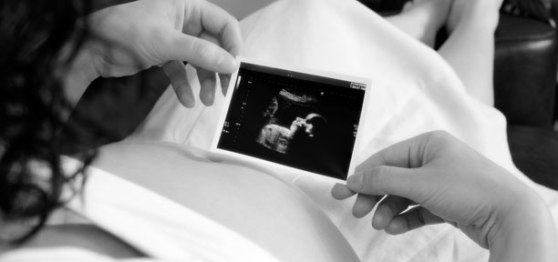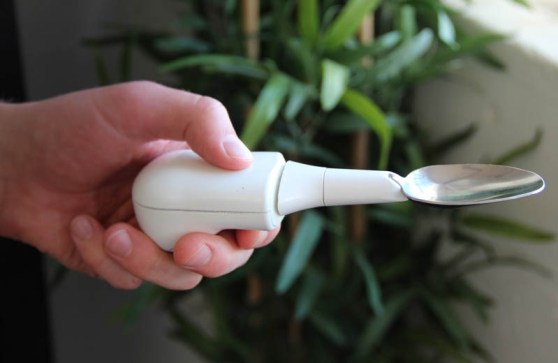6. Genetic testing for pregnant women

In recent years, the cost of genome sequencing has plummeted. Already, we’re seeing medical technologies that can more accurately diagnose disease and help doctors prescribe more targeted treatment options.
A handful of Silicon Valley companies are developing genuinely groundbreaking technology for pregnant women or couples trying to get pregnant. With a blood sample, Counsyl can screen women for over 100 genetic conditions. After all, the more you know, the more options you have.
Natera‘s test helps women who have experienced miscarriages understand exactly why they happened. For pregnant women, Ariosa Diagnostics offers a noninvasive DNA test that detects common fetal diseases as early as 10 weeks into a pregnancy — it’s far less dangerous and more accurate than an amniocentesis.
These companies are already selling their genetic test to thousands of women all over the world.
7. A spoon for people with Parkinson’s disease

At Rock Health’s recent demo day, a new gadget from Lift Labs blew me away.
People with Parkinson’s Disease often find that tremors in their hands make it difficult to use utensils. This new spoon from Lift Labs counteracts the movements of a wavering grip, reducing shaking by 70 percent.
The technology sounds revolutionary, but its underlying tech is actually an extension of the image stabilization features in today’s cameras and smartphones, which compensate for natural hand jitters. Read our full story on the spoon here.
Check out the video below to see it in action.
[youtube=http://www.youtube.com/watch?v=fS01kn6YJ94&w=420&h=315]
8. Medic Mobile
Something as simple as feature phone can make a difference in the developing world. Medic Mobile is proving that the right tools — not the flashiest — can have the most impact.
Medic Mobile chief executive Josh Nesbit got inspired to start the company after a visit to Malawi in 2007, where he met community health workers who were walking 45 miles every week to hand-deliver updates on HIV patients living in remote villages. In a CNN op-ed, the Stanford University grad explained how he bridged that gap using SMS messaging and eventually started Medic Mobile.
Medic Mobile is working with mobile health partners developing tools like a simple SIM card application, which community health workers can use to track drug stocks and receive and provide real-time reports on disease. It’s already improving health care for hundreds of thousands of people in underserved rural communities.
Check out the founding story from Nesbit in the video below.
[youtube=http://www.youtube.com/watch?v=MEZZ138ZTYI&w=560&h=315]
9. Sensor networks for the elderly
It’s always heartwarming to hear about technology that helps our grandparents and the growing aging population. Some recent examples include SafetyFiled, a cloud storage system for seniors; and True Link Financial, a fraud blocker startup.
Most impressive of all is a service that caters to people who suffer from dementia and early stage Alzheimer’s disease but want to continue living independently. A wall-mounted tablet device is at the center of it the system — the device is connected to Skype, making it easy to check in with a carer living anywhere in the world. Sensors placed throughout the home are smart enough to set off an alarm when a front door is left open, and it provides spoken reminders about daily tasks.
This smart sensor system is already in over 1,000 homes in Europe, the BBC reports, and parts of it are being developed by health care technology company Abilia.
10. A blood test without bleeding
A company called Biosense has developed a simple portable device that can test for anemia without breaking the skin. In emerging nations, anemia is relatively easy to treat, but it’s difficult to diagnose. It affects millions of people and has led to roughly one million women and infant fatalities per year, according to recent research.
The founders of Biosense built an affordable device, the ToucHb, which is small enough to fit in a lunchbox. It is already in use all over India to test people for anemia. In 2008, the company received the Piramal Prize for democratizing health care in the region. The prize has also been awarded to Teach for India and the Gandhi Fellowship.
I guarantee that the TED talk delivered by Biosense cofounder Myshkin Ingawale will lift your spirits!

